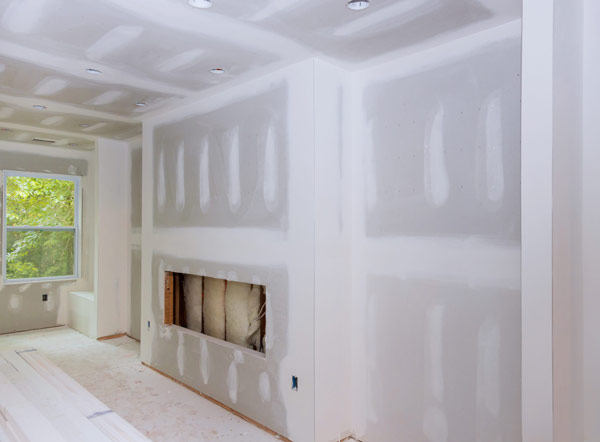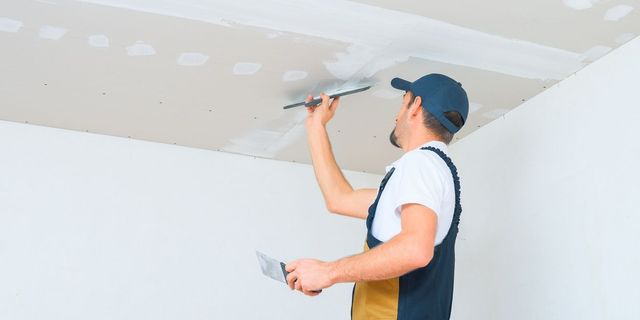A Comprehensive Overview to Mastering Drywall Fixing and Installment
This guide offers a comprehensive exploration of drywall repair work and installment, accommodating both amateurs and seasoned specialists. It details vital tools, methods for patching and hanging sheets, and the crucial finishing processes. drywall contractors. By comprehending common pitfalls, people can accomplish polished outcomes. Mastering these abilities not just boosts one's home however also develops confidence in DIY endeavors. What fundamental pointers will assure an effective task from beginning to end?
Vital Tools for Drywall Repair and Setup
When starting on drywall fixing and installment, a couple of necessary devices can considerably enhance the performance and high quality of the work. A drywall knife, usually available in various sizes, is vital for using joint compound and smoothing joints. A taping knife is likewise necessary for feathering sides and ensuring a smooth finish. Furthermore, a drywall saw or energy blade permits precise cutting of drywall sheets to fit any type of space.

Step-by-Step Guide to Patching Holes
Patching openings in drywall is a simple procedure that can bring back the wall surface's look and integrity. To begin, the location around the hole ought to be cleaned and any loosened particles eliminated. For tiny holes, an easy spackle or joint compound can be used with a putty knife. Larger holes may require a spot; an item of drywall can be reduced to fit the opening, protected with sticky or screws, and afterwards taped around the edges. When the patch is in place, joint substance is applied over the spot and feathery out to blend with the bordering wall surface. After the compound dries out, fining sand is essential to accomplish a smooth coating. Finally, the repaired area can be primed and painted to match the rest of the wall surface. This method assures a smooth repair service, enhancing the total look of the drywall and preserving its structural integrity.
Techniques for Hanging Drywall Sheets
After successfully fixing openings in drywall, the next step entails hanging new drywall sheets to create a smooth surface area. To accomplish this, one must start by determining the wall surface space accurately and cutting the drywall sheets to fit. It is vital to hang the sheets flat for far better architectural integrity, beginning from the top and working downwards.
Using a drywall lift can streamline the process, specifically for ceiling installments. When positioned, safeguarding the sheets with drywall screws at intervals of about 12 inches along the sides and 16 inches in the field is essential. This guarantees a solid hold and decreases the risk of drooping. For corners, the sheets ought to be cut to fit comfortably, permitting cleaner joints. Ultimately, it is recommended to stagger the joints in between sheets to reinforce the general structure, developing a more resilient surface ready for the following stage in the drywall installment process.
Completing Touches: Insulation and Mudding
Completing the drywall installment involves the important actions of taping and mudding, which guarantee a smooth and refined coating. Taping needs the application of joint tape over the joints in between drywall sheets. drywall contractors. This tape can be either paper or fiberglass harmonize, with each type offering one-of-a-kind advantages. After taping, the following action is mudding, where joint compound, or "mud," is put on cover the tape and fill up any kind of flaws
Utilizing a drywall knife, the substance needs to be spread equally, guaranteeing a feathered side to lessen noticeable changes. Numerous coats are often required, with fining sand in between each layer to accomplish a smooth surface area. Mindful attention you could try here throughout this procedure is crucial, as it considerably affects the final look of the wall. With the appropriate technique and perseverance, the end result will certainly be a remarkable structure ready for painting or ending up touches.
Usual Blunders to Stay Clear Of in Drywall Projects

One more usual mistake is not allowing adequate drying time in between layers, which can catch dampness and additional reading jeopardize the finish. Ignoring to feather the sides properly can create visible lines and imperfections. Avoiding sanding or using incorrect methods may leave rough spots. By understanding these pitfalls, individuals can considerably improve the quality of their drywall tasks and attain a professional-looking coating.
Often Asked Inquiries
Can I Repair Drywall Without Professional Assist?
Yes, one can repair drywall without professional assistance. With the right tools, materials, and guidance, people can successfully take care of small repairs. Considerable damages may require professional experience for ideal outcomes and toughness.
How Much Time Does Drywall Compound Take to Dry?
Drywall substance generally takes in between 24 to 48 hours to completely dry entirely, depending on aspects such as humidity and temperature. Thinner layers might dry out faster, while thicker applications require even more time for ideal outcomes.
What's the very best Sort Of Paint for Drywall?
The best sort of paint for drywall is normally a water-based latex paint. It provides exceptional coverage, resilience, and convenience of application, making it optimal for interior wall surfaces while permitting very easy cleanup with soap and water.

How Do I Prevent Mold on Drywall?
To prevent mold and mildew on drywall, warranty correct ventilation, control moisture degrees, utilize mold-resistant materials, and quickly resolve any kind of leaks. Normal assessments and instant remediation of water damage are also important for long-term avoidance.
Is Drywall Recyclable After Removal?
Drywall is recyclable after removal, provided it is without impurities like mold, paint, or other hazardous products. Recycling centers can process it right into new items, a fantastic read advertising sustainability and lowering land fill waste in building.
When beginning on drywall repair service and installation, a couple of essential devices can substantially enhance the efficiency and top quality of the work. After efficiently fixing openings in drywall, the next action involves hanging brand-new drywall sheets to create a seamless surface area. Completing the drywall installation includes the crucial steps of mudding and taping, which ensure a refined and smooth surface. Achieving a sleek coating in drywall projects can be tough, and numerous common errors can threaten the quality of the job. Yes, one can repair drywall without expert aid.